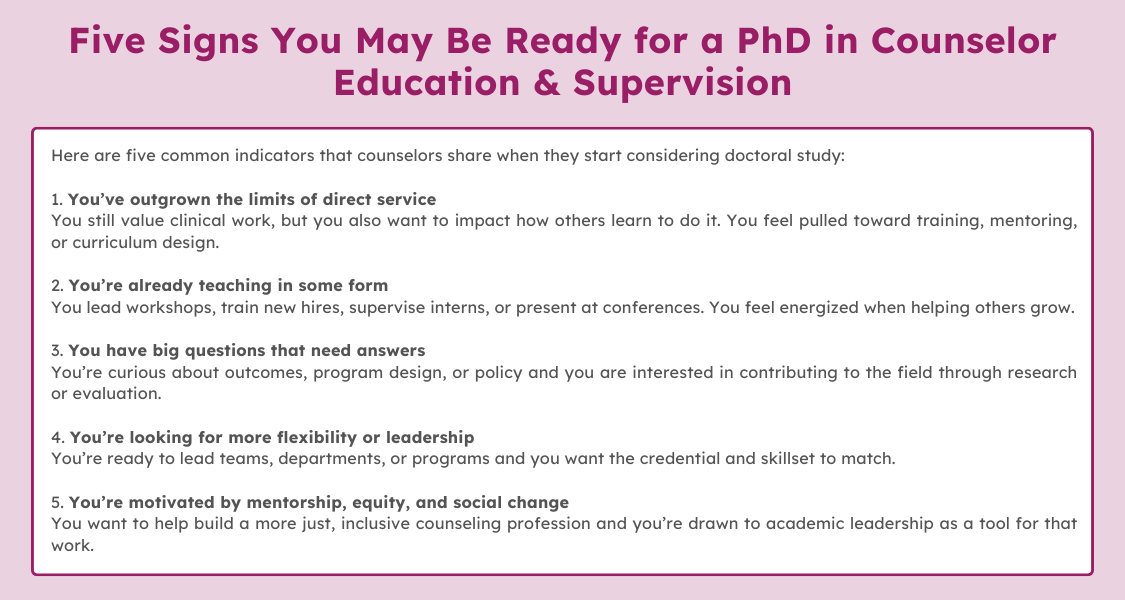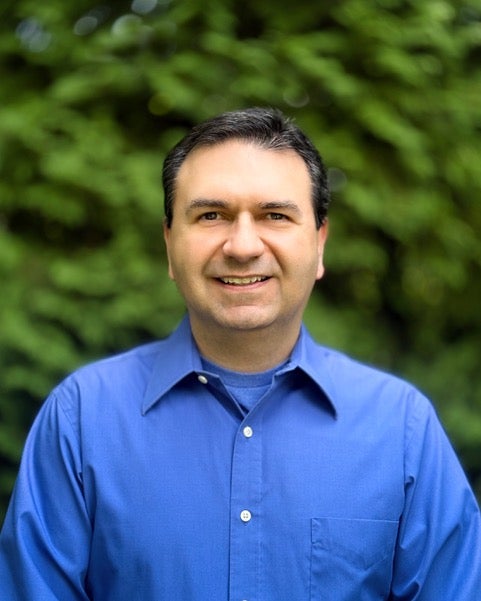
Is Now the Right Time for a PhD in Counselor Education & Supervision?

Helping professionals assess their readiness
From Reflection to Readiness
If you’ve been in the counseling field for a while, chances are you’ve already started asking some deeper questions. Maybe you’ve found great fulfillment in your clinical work but feel a growing desire to mentor new professionals. Maybe you’ve supervised interns, led trainings, or advocated for your team’s well-being and are wondering what it would be like to do more of these activities. Maybe you’re wondering, Is this still the right role for me?
If you have wondered about these types of questions, you’re not alone. Many mid-career counselors reach a point where they want to shift from individual to systemic influence and impact. As discussed in Why Do Counselors Become Educators?, that transition is not about leaving the field behind—it’s about expanding your purpose and influence with a PhD in Counselor Education & Supervision at PAU.
But even if the why feels clear, the when can be more complicated. The rest of this blog is designed to help you to explore this timing issue.
The Timing Question: “Is Now the Right Time for a PhD in Counselor Education & Supervision?”
Pursuing a doctoral degree is a big decision. It’s personal. It’s professional. And for most working clinicians, it’s also logistical. When you’re already juggling full-time work, family responsibilities, and leadership roles, adding something new to your plate can feel overwhelming. So how do you know when it’s time to take the leap? Let’s explore a few guiding questions:
Q: Are you feeling underchallenged or ready for a new kind of professional growth?
Perhaps your current role no longer stretches you in the way it once did. You may feel competent but restless—perhaps you are craving new opportunities to lead, influence, and grow. This sense of “more to give” isn’t dissatisfaction; it’s a signal that you’re ready for the next level of professional responsibility and impact.
Q: Have you been mentoring or supervising and wondering how to do more of it?
If you are energized in helping others grow—whether through intern supervision, staff training, or informal mentoring—those instincts are more than just helpful; they’re foundational to counselor education. A doctoral program can turn your mentorship into a central professional identity, not just an extra responsibility.
Q: What would it take to make space for doctoral study in your current life?
You don’t need a perfect schedule—just a sustainable plan and the right support. Many doctoral students are full-time professionals and caregivers who choose flexible programs built around their lives. The better question might be: What kind of support and structure would make this doable for you?
If these questions stir something in you, you may be closer to readiness than you think. In addition to these questions, take a look at the section below for a different practical self-check that provides another way of exploring whether you are ready to take the next step in your professional development.
Explore our PhD Counselor Education and Supervision program.

Making It Work: Time, Format, and Flexibility
You might be thinking This sounds like me, but I don’t know how I’d manage it. That’s a common (and valid) concern. Fortunately, many PhD in Counselor Education & Supervision degree programs are built for working professionals. With hybrid formats, weekend intensives, and virtual learning communities, many programs offer the flexibility you need to stay grounded in your work and life while expanding your professional reach.
Fast facts:
- Average completion time: 3–4 years (for full-time enrollment)
- Hybrid format: Combines in-persons residencies with virtual work
- Designed for licensed or license-eligible clinicians
- Emphasis on mentorship, teaching, supervision, and research
Emotional Readiness: What Does Your Inner Voice Say?
While practical readiness (including schedules, finances, support systems) is often top of mind when considering a doctoral program, emotional readiness is just as important. In fact, it may be the most telling indicator of whether you’re truly prepared to step into this new chapter of your career.
Pursuing a PhD means stepping back into the learner role. That can feel exhilarating, humbling, and at times vulnerable. After years of being the expert, the one clients turn to, it’s normal to wonder: Do I still have the capacity to be stretched? Am I ready to not have the answers? These questions are not red flags; they’re signs of self-awareness. And they often point to an important truth: you’re likely more ready than you think.
Reframing Vulnerability as Strength. Emotional readiness isn’t about certainty; it’s about willingness. It’s the willingness to be challenged, to receive feedback, and to grow beyond the comfort of what you already know. It means stepping into spaces where your experience is valued—but also where you’ll be invited to think more critically, lead more intentionally, and connect more deeply with your purpose. You may worry about whether you’ll be able to keep up, whether your writing is strong enough, or whether you’ll belong in a scholarly space. These are common fears. What matters is that you’re willing to engage with them—not alone, but within a supportive academic community that understands your journey.
The Power of Community and Mentorship. One of the most important emotional buffers in doctoral study is connection. In well-designed programs, you’re not just taking courses—you’re building relationships with faculty, peers, and future colleagues. You’ll be part of a community where your voice matters and where your experience enriches every classroom discussion, research project, and group collaboration. Mentorship plays a critical role here. Good programs don’t leave students to navigate the journey alone. Faculty advisors and mentors are there to guide, challenge, and support—not to gatekeep your progress, but to champion your development and success.
Reconnecting With Your Purpose. If you’ve made it this far in your counseling career, you already have deep emotional resilience, empathy, and drive. A doctoral program is not a rejection of your current path—it’s an expansion of it. It’s a chance to reconnect with why you entered this profession in the first place: to help, to heal, to lead. You can ask yourself:
- Am I ready to be challenged in ways that help me grow?
- Am I open to re-engaging with the curiosity and courage that brought me into this field?
- Am I willing to be supported—and to support others—through the process?
If the answer is “yes” or even “I think so,” then you’re on the right track.
From Hesitation to Action. It’s normal to have doubts. But those doubts often sit side-by-side with possibility. The question isn’t just, “Can I do this?” but also, “What would it mean if I did?”
A PhD in Counselor Education & Supervision isn’t just about earning a title. It’s about stepping into a new kind of leadership—one that allows you to shape the future of counseling through education, mentorship, advocacy, and social justice.
You don’t have to have it all figured out. But you do deserve to explore the next chapter of your purpose-driven career. Thinking about it means you’re already moving toward it. Let’s find out what’s next!
About the Author
 Dr. Alex Casillas is a seasoned psychologist and educator with over two decades of experience in applied psychology, assessment, and counselor education. Currently serving as a Principal Research Psychologist in the assessment industry and an Adjunct Instructor in Applied Psychology at NYU Steinhardt, Dr. Casillas bridges research and practice to enhance counselor training and educational equity. His academic journey includes a Ph.D. from the University of Iowa and a B.A. from Grinnell College. He is originally from Mexico and a fierce advocate of inclusion, belonging, and equity. Through his work, Dr. Casillas emphasizes the importance of culturally responsive practices and empirically-informed strategies in counselor education.
Dr. Alex Casillas is a seasoned psychologist and educator with over two decades of experience in applied psychology, assessment, and counselor education. Currently serving as a Principal Research Psychologist in the assessment industry and an Adjunct Instructor in Applied Psychology at NYU Steinhardt, Dr. Casillas bridges research and practice to enhance counselor training and educational equity. His academic journey includes a Ph.D. from the University of Iowa and a B.A. from Grinnell College. He is originally from Mexico and a fierce advocate of inclusion, belonging, and equity. Through his work, Dr. Casillas emphasizes the importance of culturally responsive practices and empirically-informed strategies in counselor education.
References
CACREP (n.d.) Counselor education and supervision doctoral standards. Retrieved from: https://www.cacrep.org/section-6-doctoral-standards-counselor-education-and-supervision/?utm_source=chatgpt.com
